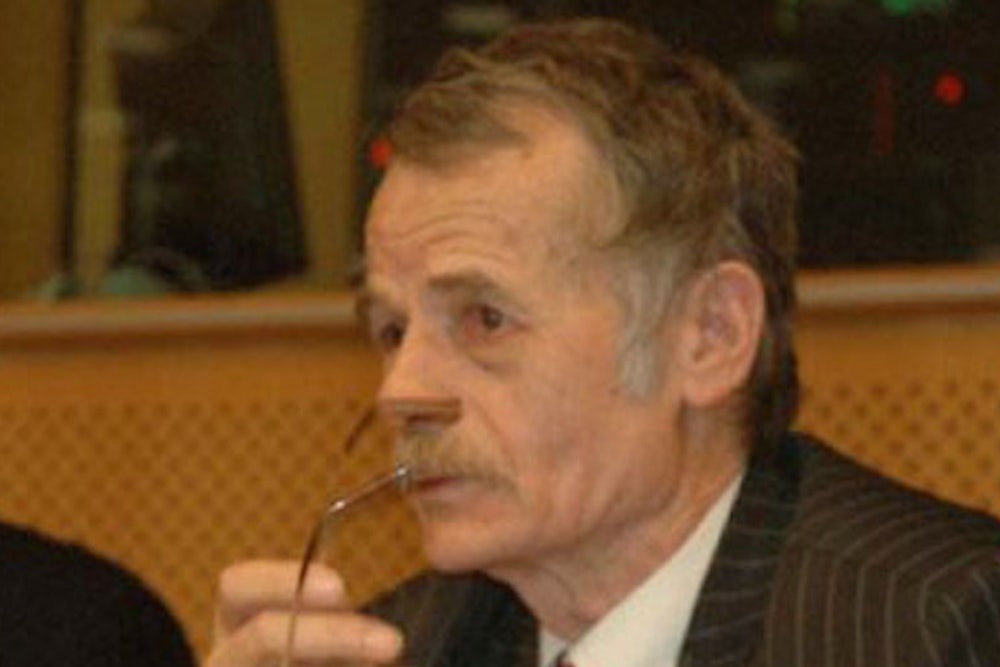If the West isn't going to protect Ukraine from Russian aggression, then Ukraine should defend itself by rebuilding its nuclear arsenal.
That's what Crimean Tatar leader Mustafa Dzhemilev told a full house at the Carnegie Endowment for International Peace in D.C. on Wednesday. Ukraine denuclearized in 1994, when Russia, Great Britain, and the U.S. signed the Budapest Memorandum promising to protect the territorial integrity of Ukraine in exhange for the country's accession to the Nuclear Non-Proliferation Treaty. Russia violated the agreement by invading Crimea, Dzhemilev says, so why shouldn’t Ukraine get nukes again?
Dzhemilev, a member of the Ukrainian Parliament and former chair of the Crimean Tatar Mejlis, the official governing body of the Tatars, was born just months before Stalin deported the entire Crimean Tatar population to Siberia. The memory of that deportation, which killed over half of the Crimean Tatar population, is first among many reasons why the Tatars are growing increasingly anxious under Russian rule. Dzhemilev grew up in exile and only returned to Crimea in 1989, by which time it had long been populated by the current ethnic Russian majority. “We in Ukraine feel cheated, we feel that we were betrayed,” he said. “Now, we need to regain our nuclear status.” (Russia denies that it violated the Budapest agreement.)
Meanwhile, the date of April 18 looms for the 290,000 Crimean Tatars living on the Russian-controlled peninsula. That's when all residents of Crimea will automatically become Russian citizens unless they submit an official statement expressing their desire to retain Ukrainian nationality. The deadline will make life very difficult for Crimean Tatars, who will not be able to work in any official government jobs if they do not accept Russian citizenship. “We will lose all of our civil rights, and be considered foreigners in our own land,” Dzhemilev said. “We expect a serious blow.”
“Once people become Russian citizens, we end up in a trap,” Dzhemilev explained. Under Russian law, any discussion of territorial change of Russian property is considered separatism, punishable by five years in jail. Already, Ukrainian and Crimean Tatar schools are being shut down in Crimea, and the use of both languages in public is increasingly taboo—Ukrainian especially, says Dzhemilev. Crimean priests of the Ukrainian Orthodox Church, unable to pray in their own churches, may begin holding services in Tatar mosques, the only place where they may find brief asylum. Many loyal to the Ukrainian church have already fled, as have more than 5,000 Crimean Tatars. Those who express views that diverge from Kremlin propaganda will put their lives at risk, so the Crimean Tatars are thinking about establishing their own independent television network—based somewhere in Europe, beyond Putin’s reach—to broadcast news to the Crimean Tatar diaspora.
“We were full of hope that things were going to change for the better,” Dzhemilev said. But then Russia invaded. And despite Putin's personal assurances to Dzhemilev that the Tatars will be left alone, now, Dzhemilev says, “we’ve reached the line where we cannot guarantee that blood is not going to be spilled.” Pleading for the West to impose stronger sanctions on Russia, Dzhemilev said that if immediate action isn’t taken to stop Russian expansionism, “Later, we will spend 100 times more money. ...If the U.S. had acted more decisively in 2008, we would not see what we’ve seen in Crimea. Pretty soon, we’ll see Russian troops in Brussels.”
